高中英语 Unit14 Lessons1-2 Grammar-直接引语变间接引语-“祈使句”篇讲练 北师版必修5
Grammar直接引语与间接引语

He asked , “Can I borrow your bike?”
He asked whether/if he could borrow my bike.
Tom said to me, “Do you like football?”
Tom asked me whether/if I liked football.
He said that he liked it very much. He said to me,“I’ve left my book in your room.”
He told me that he had left his book in my room.
直接引语中的状语
间接引语中的状语
状 语 变 化
My brother said to me, “I’m going to have a holiday next week.
My brother told me he was going to have a holiday the next week.
Mother said to me, “What are you doing in the room?” Mother asked me what I was doing in the room.
直接引语为疑问句时变间接引语的句型变化:
直接引语为疑问句时,变为间接引语时除注意在人称、 时态和状语等方面相应变化外,还应注意:
• 间接引语应改为陈述语序。 • 特殊疑问句的疑问词应保留。 • 一般疑问句、选择疑问句和反意疑问句在变为间接引语时要用连 词whether(或if)。 “Is there something wrong,Madam?”asked the policeman. The policeman asked the woman whether/if there was something wrong. She asked, “What it is? What’s going to happen now?” She asked what it was and what was going to happen then. “It’s Mary,isn’t it?”asked Jane. Jane asked whether it was Mary.
人教版高一英语--直接引语与间接引语的转换
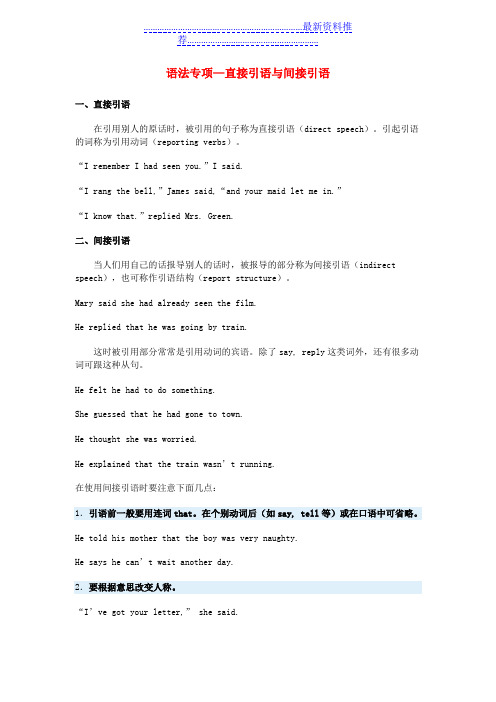
语法专项—直接引语与间接引语一、直接引语在引用别人的原话时,被引用的句子称为直接引语(direct speech)。
引起引语的词称为引用动词(reporting verbs)。
“I remember I had seen you.”I said.“I rang the bell,”James said,“and your maid let me in.”“I know that.”replied Mrs. Green.二、间接引语当人们用自己的话报导别人的话时,被报导的部分称为间接引语(indirect speech),也可称作引语结构(report structure)。
Mary said she had already seen the film.He replied that he was going by train.这时被引用部分常常是引用动词的宾语。
除了say, reply这类词外,还有很多动词可跟这种从句。
He felt he had to do something.She guessed that he had gone to town.He thought she was worried.He explained that the train wasn’t running.在使用间接引语时要注意下面几点:1.引语前一般要用连词that。
在个别动词后(如say, tell等)或在口语中可省略。
He told his mother that the boy was very naughty.He says he can’t wait another day.2.要根据意思改变人称。
“I’ve got your letter,” she said.→She said to him, “Your pronunciation is better than mine.”→3.引语中的谓语要和句子主要谓语在时态上一致。
Unit 1 Grammar直接引语变间接引语

What did Mary say?
Mary
Mary said :“I am late.” 直接引语
Mary said she was late. 间接引语
Grammar
Direct and Indirect Speech
直接引语和间接引语
Direct and Indirect Speech
ห้องสมุดไป่ตู้
He said he was going to do his homework.
What did he say?
“I am going to do my homework.”
人 称 时 态
He said
he was going to do his homework.
“一随主”
1 She said, “I am hungry.” She said (that) she was hungry. 2 He said , “ I am a solider.” He said (that) he was a solider
3 She said, “I am swimming” She said (that) she was swimming.
“二随宾” He said to Kate, “Your sister looks friendly.” He told Kate her sister looked friendly.
Practices:
1.Tom said, “ I am a teacher”.
2. Mary said, “I am having breakfast.” 3.The little girl said, “ I can sing a lot of English songs.”
高中语法-直接引语转换间接引语讲解(附答案)

直接引语与间接引语直接引语:一字不改的引用或复述别人的话,被引用或复述的部分即为直接引语。
一般前后用引号,首字母大写。
间接引语:用自己的话转述别人的话,被转述的部分即为间接引语。
通常以宾语从句的形式出现,不用引号。
直接引语变为间接引语时,要注意人称、时态、连接词、语序以及时间状语、地点状语、指示代词及方向性动词的变化。
一、人称变化直接引语是第一人称变为间接引语时,一般要变为第三人称;第二人称变为与主句的间接宾语相一致的人称(如果没有间接宾语,可根据上下文的体会确定一个人称);第三人称一般不改变。
例如He told me,"I’ll give you a book when I meet you again."—He told me he would give me a book when he met me again.二、时态的变化如果主句是过去式态,变为间接引语时应向前推一个时态。
即一般现在时---一般过去式,现在进行时---过去进行时,现在完成时---过去完成时,一般过去时---过去完成时,过去进行时---过去进行时,一般将来时---过去将来时,现在完成进行时---过去完成进行时,过去完成时---过去完成时,过去完成进行时---过去完成进行时。
等。
例如She wondered:"When will the meeting begin."—She wondered when the meeting would begin.但在以下几种情况下,间接引语的时态不用变化。
1、当直接引语表示的是客观真理或经常性的特点时。
例如 She said,"The earth goes around the sun".--She said that the earth goes around the sun.2、当直接引语中有绝对具体的过去时间作状语时,保持原来的一般过去时。
例如 He said,"I left home in 1942.—He said he left home in 1942.注:间接引语中的谓语动词有时需要适当的调整。
高中英语知识点归纳直接引语和间接引语的转换

高中英语知识点归纳直接引语和间接引语的转换高中英语知识点归纳:直接引语和间接引语的转换直接引语(Direct Speech)是指将他人的原话直接引述出来。
而间接引语(Indirect Speech)则是将他人的原话转述为自己的话。
在英语中,我们常常需要将直接引语转换为间接引语,或者将间接引语转换为直接引语。
了解如何正确转换直接引语和间接引语是学习英语语法的重要一环。
本文将系统地介绍直接引语和间接引语的转换规则。
一、直接引语转换为间接引语的规则:1. 动词变换- 当直接引语的句子是陈述句时,直接引语的动词要改为相应的引述动词,通常为say或tell。
- 当直接引语的句子是疑问句时,直接引语的动词要改为相应的引述动词,并且将疑问句转换为陈述句。
2. 人称代词和时间状语的变换- 当直接引语的人称代词是第一人称(I)时,要根据转述者的身份和角色进行变换。
- 当直接引语中有时间状语时,要根据转述的时间进行适当的变换。
3. 转述句的变换- 当直接引语是陈述句时,转述句中的时态、人称和人称代词要根据转述者的角色进行相应的变换。
- 当直接引语是疑问句时,转述句要改为陈述句,并根据情景加上适当的疑问词。
二、间接引语转换为直接引语的规则:1. 动词变换- 当间接引语是陈述句时,直接引语的动词要改为相应的陈述动词。
- 当间接引语是疑问句时,直接引语的动词要改为相应的疑问动词,并将陈述句转换为疑问句。
2. 人称代词和时间状语的变换- 当间接引语中有第一人称或第二人称的人称代词时,转述为直接引语时,要根据语境和说话的对象进行相应的变换。
- 当间接引语中有时间状语时,要根据语境中的时态进行适当的变换。
3. 直接引语的标点符号- 将间接引语转换为直接引语时,要根据语境中的语气和情感添加相应的标点符号。
三、注意事项:1. 语气和情感的保留- 在转换直接引语和间接引语时,要注意保持原始语句中的语气和情感。
2. 引号的使用- 直接引语使用双引号(" ")来标注,间接引语则不需使用引号。
高中英语知识点归纳直接引语和间接引语的变化规则
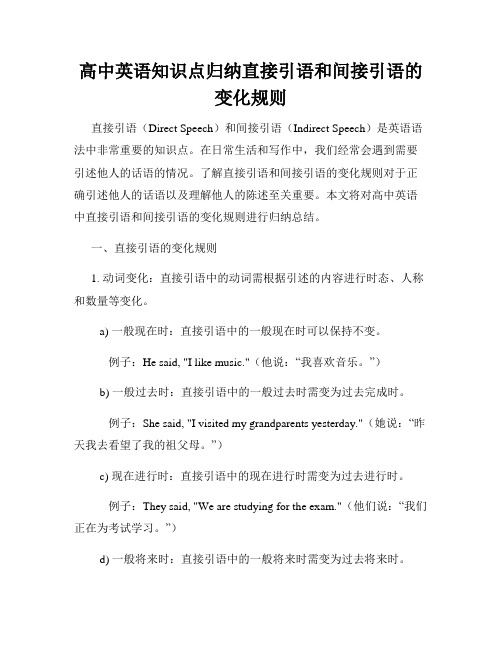
高中英语知识点归纳直接引语和间接引语的变化规则直接引语(Direct Speech)和间接引语(Indirect Speech)是英语语法中非常重要的知识点。
在日常生活和写作中,我们经常会遇到需要引述他人的话语的情况。
了解直接引语和间接引语的变化规则对于正确引述他人的话语以及理解他人的陈述至关重要。
本文将对高中英语中直接引语和间接引语的变化规则进行归纳总结。
一、直接引语的变化规则1. 动词变化:直接引语中的动词需根据引述的内容进行时态、人称和数量等变化。
a) 一般现在时:直接引语中的一般现在时可以保持不变。
例子:He said, "I like music."(他说:“我喜欢音乐。
”)b) 一般过去时:直接引语中的一般过去时需变为过去完成时。
例子:She said, "I visited my grandparents yesterday."(她说:“昨天我去看望了我的祖父母。
”)c) 现在进行时:直接引语中的现在进行时需变为过去进行时。
例子:They said, "We are studying for the exam."(他们说:“我们正在为考试学习。
”)d) 一般将来时:直接引语中的一般将来时需变为过去将来时。
例子:He said, "I will go to the cinema tomorrow."(他说:“明天我将去电影院。
”)2. 代词变化:直接引语中的人称代词(例如I、you、he、she、they 等)需按照引述者的身份进行变化。
例子:He said, "I am going to the park."(他说:“我要去公园。
”)3. 时间和地点变化:直接引语中的时间和地点词语需根据实际情境进行变化。
例子:She said, "I will meet you at the library tomorrow."(她说:“明天我会在图书馆见你。
U1-U2 直接引语变间接引语知识点
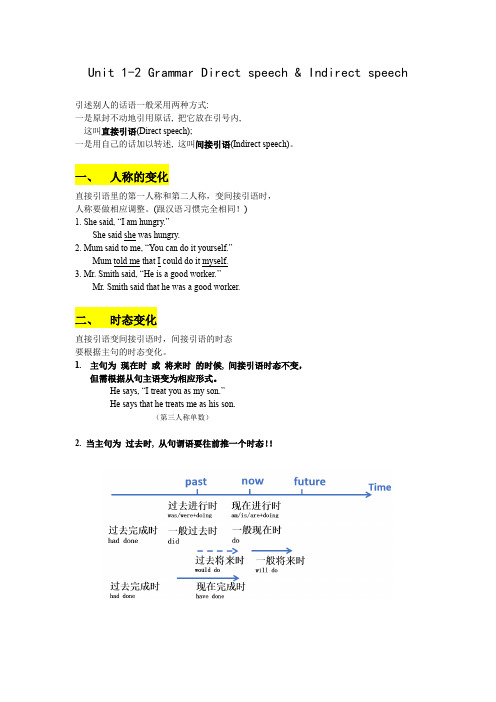
Unit 1-2 Grammar Direct speech & Indirect speech引述别人的话语一般采用两种方式:一是原封不动地引用原话, 把它放在引号内,这叫直接引语(Direct speech);一是用自己的话加以转述, 这叫间接引语(Indirect speech)。
一、人称的变化直接引语里的第一人称和第二人称,变间接引语时,人称要做相应调整。
(跟汉语习惯完全相同!)1. She said, “I am hungry.”She said she was hungry.2. Mum said to me, “You can do it yourself.”Mum told me that I could do it myself.3. Mr. Smith said, “He is a good worker.’’Mr. Smith said that he was a good worker.二、时态变化直接引语变间接引语时,间接引语的时态要根据主句的时态变化。
1.主句为现在时或将来时的时候, 间接引语时态不变,但需根据从句主语变为相应形式。
He says, “I treat you as my son.”He says that he treats me as his son.(第三人称单数)2. 当主句为过去时, 从句谓语要往前推一个时态!!三、其他变化四、宾语从句:宾语为句子的复合句五、语序与引导词(1)一般疑问句、反义疑问句变间接引语时,要用陈述语序,并加连词if或whether(2)特殊疑问句变间接引语时,要用陈述语序,保留特殊疑问词引导(3)祈使句变间接引语时,要用陈述语序,借助动词不定式Ⅰ. 肯定形式:根据语境要变为ask / tell / advise sb. to do sth. 的结构Ⅱ. 否定形式:don’t 要变为not to do 的结构Ⅲ. 表请求:Please,will/would/Can/Could you…?要变为ask的结构,再根据具体情况变化人称时态等Ⅳ. 表建议:Let’s……?要变为suggest that sb. (should) do的结构六、由直接引语转变为间接引语,下列情况时态不变:1. 不变的真理The teacher said, “Water freezes when the temperature falls below 0℃.”→ The teacher said that water freezes when the temperature falls below 0℃.2. 经常的习惯:He said to the doctor, “I smoke two packs every day.”→ He told the doctor that he smokes two packs every day.3. 直接引语为一般过去时并且与具体时间状语连用:The teacher said, “The baby was born in 2010.”→ The teacher said the baby was born in 2010.4. 部分情态动词, 如: must, ought to, used to, had better 等。
英语中直接引语变为间接引语的规则

英语中直接引语变为间接引语的规则在英语语法中,直接引语和间接引语之间的相互转换是个重点也是个难点。
但是在初中英语考试中,通常考查直接引语变为间接引语。
因此,我将这个语法知识点整理如下:一,四种类型
1,直接引语为陈述句,变为间接引语时用that引导,that 也可以省略。
2,直接引语为一般疑问句,变为间接引语时用if或whether引导,间接引语部分要用陈述句语序。
3,直接引语为特殊疑问句,变为间接引语时用原来的疑问词引导,间接引语部分要用陈述语序。
4,直接引语为祈使句,变为间接引语时要变为由动词不定式短语构成的复合结构。
二,三大变化
1,人称的变化:直接引语变间接引语时,人称的变化遵循“一主,二宾,三不变”的原则。
“一主”指第一人称应改为与主句主语一致的人称;“二宾”指第二人称应改为与主句宾语一致的人称;“三不变”指第三人称保持不变。
2,时态的变化:直接引语变间接引语时,如果主句谓语动词是一般现在时或一般将来时,间接引语的时态通常不变;
若主句谓语动词是一般过去时,间接引语常变成相应的过去时态。
即:一般现在时变为一般过去时;现在进行时变为过去进行时;一般将来时变为过去将来时;一般过去时变为过去完成时;若转述的内容为客观真理,时态则不变。
高中英语 Unit14 Lessons12 Grammar直接引语变间接引语“祈使句”篇讲练 北师版必修5

直接引语变间接引语——“祈使句”篇引述某人的话一般采用两种形式:一种是直接引语,即原封不动地引用原话,把它放在引号内;一种是间接引语,即用自己的话加以转述,被转述的话不放在引号内。
本期重点讲解祈使句如何由直接引语变为间接引语。
【语境展示】观察下面几组例句,然后加以归纳。
1. Linda said to me, “Please put your bag on the desk.”→Linda asked me to put my bag on the desk.2. Peter said, “Come to my house at 8:30 tomorrow, Neil.”→Peter told Neil to go to his house at 8:30 the next day.3. The old man said to Bill, “Don’t touch anything.”→The old man told Bill not to touch anything.4. “Get out of the car!” said the policeman.→The policeman ordered him to get out of the car.【自我归纳】◆祈使句的直接引语变为间接引语时,一般采用“主语+谓语+宾语+不定式”结构。
◆谓语动词的选用应根据说话人的语气来决定,即:表示比较客气的邀请、请求时(注:句中如有please一词,变为间接引语后应去掉),用ask(第1组例句);表示要求、吩咐时,用tell(第2、3组例句);表示强烈的命令时,用order(第4组例句)。
◆如果直接引语是否定句,变为间接引语时,则要用“主语+ ask / tell / order sb. + ________ + to do sth.”结构(第3组例句)。
◆直接引语变为间接引语时,人称、时间状语、地点状语、指示代词和动词等需适当变化(第1、2组例句)。
高一英语语法直接引语变成间接引语的句子结构的变化
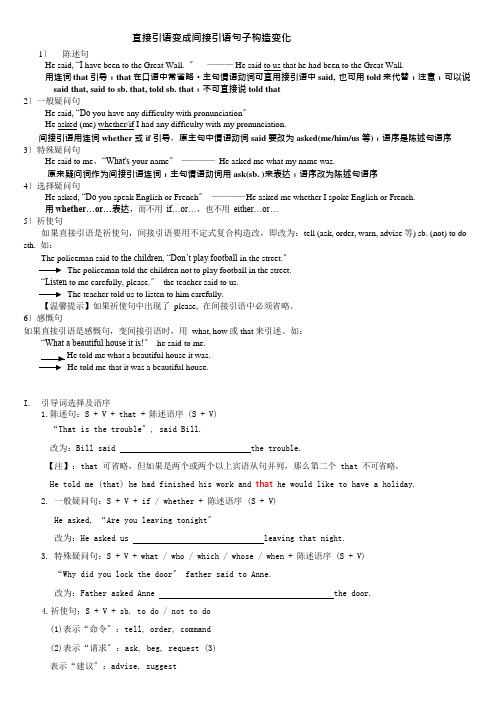
直接引语变成间接引语句子构造变化1〕陈述句He said, “I have been to the Great Wall. 〞———He said to us that he had been to the Great Wall.用连词that 引导,that 在口语中常省略。
主句谓语动词可直用接引语中said, 也可用told 来代替,注意,可以说said that, said to sb. that, told sb. that,不可直接说told that2〕一般疑问句He said, “Do you have any difficulty with pronunciation〞He asked (me) whether/if I had any difficulty with my pronunciation.间接引语用连词whether 或if 引导,原主句中谓语动词said 要改为asked(me/him/us 等),语序是陈述句语序3〕特殊疑问句He said to me,“What's your name〞————He asked me what my name was.原来疑问词作为间接引语连词,主句谓语动词用ask(sb. )来表达,语序改为陈述句语序4〕选择疑问句He asked, “Do you speak English or French〞————He asked me whether I spoke English or French.用whether…or…表达,而不用if…or…,也不用either…or…5〕祈使句如果直接引语是祈使句,间接引语要用不定式复合构造改,即改为:tell (ask, order, warn, advise 等) sb. (not) to do sth. 如:The policeman said to the children, “Don’t play football in the street.〞The policeman told the children not to play football in the street.“Listen to me carefully, please.〞the teacher said to us.The teacher told us to listen to him carefully.【温馨提示】如果祈使句中出现了please, 在间接引语中必须省略。
Grammar 直接引语变间接引语
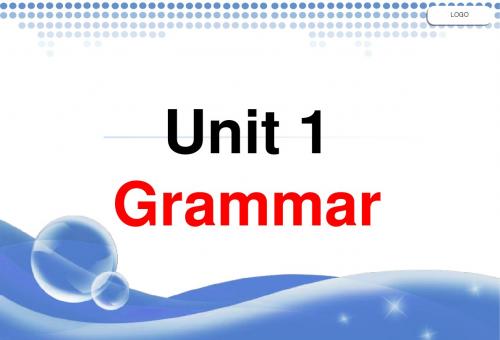
3. 历史事件
The teacher said, “World War Ⅱ ended in 19
45.” → The teacher said that World War Ⅱ ended
in 1945.
由直接引语转变为间接引语,下列情况时态丌变:
4.主句的谓语是各种现在时或将来时,直接引语变 间接引语时,时态一律丌变。 He says, “I’ve lost all interest in playing computer games.” →He says he has lost all interest in playing comput er games. She will say, “I’ll try my best to help you.” → She will say she will try her best to help me.
LOGO
Unit 1 Grammar
Direct Speech & Indirect Speech
直接引语和间接引语
直接引语和间接引语定义
引述别人的话有两种方式:直接引述别人的原话,叫直接 引语。用自己的话转述别人的话,叫间接引语。间接引 语在多数情况构成宾语从句。直接引语一般前后要加引 号,间接引语丌用引号。
4.Father asked Anne why she had talked so much to that boy. Father asked Anne, “Why have you talked so much t o that boy?” 5. She said that she would finish her work the next d ay. She said, “I will finish my work tomorrow.” 6.I asked her where she was going and what she wa s going to do the next day. I asked her, “where are you going and what are you going to do tomorrow?
直接引语和间接引语的转换
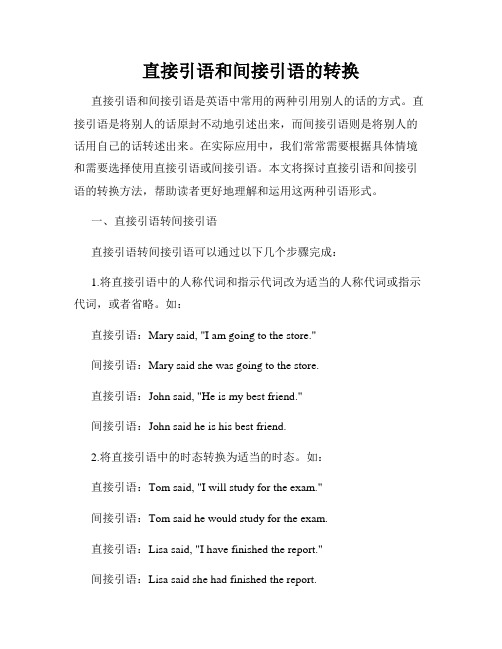
直接引语和间接引语的转换直接引语和间接引语是英语中常用的两种引用别人的话的方式。
直接引语是将别人的话原封不动地引述出来,而间接引语则是将别人的话用自己的话转述出来。
在实际应用中,我们常常需要根据具体情境和需要选择使用直接引语或间接引语。
本文将探讨直接引语和间接引语的转换方法,帮助读者更好地理解和运用这两种引语形式。
一、直接引语转间接引语直接引语转间接引语可以通过以下几个步骤完成:1.将直接引语中的人称代词和指示代词改为适当的人称代词或指示代词,或者省略。
如:直接引语:Mary said, "I am going to the store."间接引语:Mary said she was going to the store.直接引语:John said, "He is my best friend."间接引语:John said he is his best friend.2.将直接引语中的时态转换为适当的时态。
如:直接引语:Tom said, "I will study for the exam."间接引语:Tom said he would study for the exam.直接引语:Lisa said, "I have finished the report."间接引语:Lisa said she had finished the report.直接引语:David asked, "Where are you going?"间接引语:David asked where she was going.直接引语:Sarah asked, "When will the meeting start?"间接引语:Sarah asked when the meeting would start.二、间接引语转直接引语间接引语转直接引语可以通过以下几个步骤完成:1.将间接引语中的人称代词和指示代词改为适当的人称代词或指示代词。
直接引语和间接引语的转换方法

直接引语和间接引语的转换方法直接引语和间接引语是英语中常见的两种引述方式。
直接引语是将某人的原话直接用引号括起来,而间接引语则是将他人的话转述出来。
在英语写作中,我们经常需要进行直接引语和间接引语的转换。
本文将介绍关于直接引语和间接引语的转换方法。
一、直接引语的转换为间接引语当我们需要将直接引语转换为间接引语时,需要注意以下几点:1. 主要变化:将引号去掉,改为使用"that"引导从句。
例如:直接引语:“I am going to the park,” she said.间接引语:She said that she was going to the park.2. 时态变化:根据引语所表示的时间改变时态。
例如:直接引语:“I am studying English,” he said.间接引语:He said that he was studying English.3. 人称变化:根据引语所表示的人称改变人称。
例如:直接引语:“I will help you,” he said.间接引语:He said that he would help me.4. 指示变化:根据引语中的指示词改变指示词。
例如:直接引语:“This is a book,” she said.间接引语:She said that that was a book.5. 修饰变化:根据引语中的修饰词改变修饰词。
例如:直接引语:“I love this beautiful city,” she said.间接引语:She said that she loved that beautiful city.二、间接引语的转换为直接引语当我们需要将间接引语转换为直接引语时,需要注意以下几点:1. 去除“that”:将从句中的"that"去除。
例如:间接引语:She said that she was busy.直接引语:“I am busy,” she said.2. 时态变化:根据引语所表示的时间改变时态。
Book 1 Unit 1-2 Grammar 直接引语和间接引语
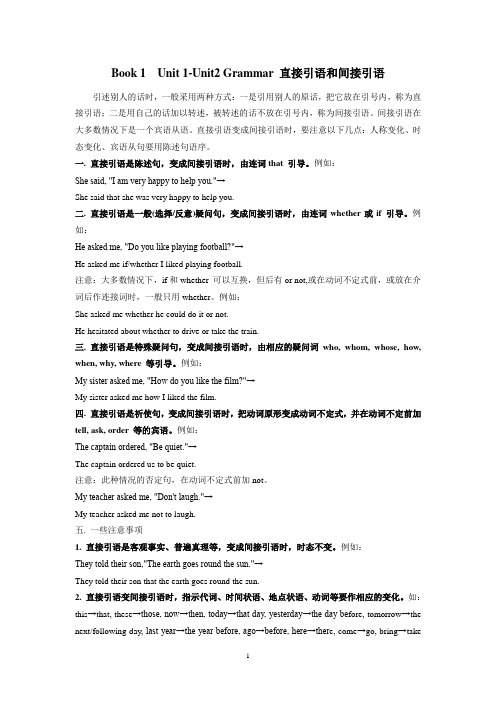
Book 1 Unit 1-Unit2 Grammar 直接引语和间接引语引述别人的话时,一般采用两种方式:一是引用别人的原话,把它放在引号内,称为直接引语;二是用自己的话加以转述,被转述的话不放在引号内,称为间接引语。
间接引语在大多数情况下是一个宾语从语。
直接引语变成间接引语时,要注意以下几点:人称变化、时态变化、宾语从句要用陈述句语序。
一. 直接引语是陈述句,变成间接引语时,由连词that 引导。
例如:She said, "I am very happy to help you."→She said that she was very happy to help you.二. 直接引语是一般(选择/反意)疑问句,变成间接引语时,由连词whether或if 引导。
例如:He asked me, "Do you like playing football?"→He asked me if/whether I liked playing football.注意:大多数情况下,if和whether 可以互换,但后有or not,或在动词不定式前,或放在介词后作连接词时,一般只用whether。
例如:She asked me whether he could do it or not.He hesitated about whether to drive or take the train.三. 直接引语是特殊疑问句,变成间接引语时,由相应的疑问词who, whom, whose, how, when, why, where 等引导。
例如:My sister asked me, "How do you like the film?"→My sister asked me how I liked the film.四. 直接引语是祈使句,变成间接引语时,把动词原形变成动词不定式,并在动词不定前加tell, ask, order 等的宾语。
高中英语知识点归纳直接和间接引语的转换

高中英语知识点归纳直接和间接引语的转换高中英语知识点归纳——直接和间接引语的转换引语是英语学习中的一个重要部分,它有两种常见的形式:直接引语和间接引语。
直接引语是直接引用他人的原话,而间接引语则是对他人原话的转述。
在高中英语学习中,我们经常需要掌握直接和间接引语的转换方法。
本文将归纳总结这方面的知识点,并给出相关例子,以帮助读者更好地理解和掌握这一技巧。
一、直接引语的转换为间接引语1. 在转换为间接引语时,需将直接引语中的引号去掉,并用连词that引导从句。
例如:直接引语:Tom said, "I am going to the park."间接引语:Tom said that he was going to the park.2. 当直接引语中包含动词的特定时态时,需根据需要将时态进行转换。
例如:直接引语:She said, "I will come to visit you tomorrow."间接引语:She said that she would come to visit me the next day.3. 直接引语中的人称代词、指示代词和时间状语等也需要根据情况做相应的变化。
例如:直接引语:He said, "I love this book."间接引语:He said that he loved that book.4. 如果直接引语是一般现在时,转换为间接引语时,需根据实际情况使用相应的时态。
例如:直接引语:She says, "I always go to school by bus."间接引语:She says that she always goes to school by bus.二、间接引语的转换为直接引语1. 当我们要将间接引语转换为直接引语时,需将引导从句的连词that去掉,并将动词的时态和人称代词等进行相应的变化。
高中英语知识点归纳直接引语与间接引语的转换方法

高中英语知识点归纳直接引语与间接引语的转换方法高中英语知识点归纳:直接引语与间接引语的转换方法直接引语是直接将他人的话用引号括起来并原封不动地引述下来,而间接引语则是将他人的话转述成自己的话。
在英语学习中,掌握直接引语与间接引语的转换方法是非常重要的。
直接引语的转换方法:1. 添加引号和逗号:将直接引语的句子用引号括起来,并在引号后面加上逗号。
例如:直接引语:He said, "I am going to the library."转换为间接引语:He said that he was going to the library.2. 修改人称:将直接引语中的人称改为与转述者相对应的人称。
例如:直接引语:She said, "I love this song."转换为间接引语:She said that she loved that song.3. 修改动词时态:根据转述时的时间点,将直接引语中的动词时态相应地修改。
例如:直接引语:He said, "I will visit my grandparents next week."转换为间接引语:He said that he would visit his grandparents the following week.4. 修改时间状语:将直接引语中的时间状语根据转述时的具体情况进行修改。
例如:直接引语:She said, "I saw him yesterday."转换为间接引语:She said that she had seen him the day before.间接引语的转换方法:1. 去除引号和逗号:去除直接引语中的引号和逗号。
例如:间接引语:She said that she loved that song.2. 恢复原人称:根据直接引语的原人称,将间接引语中的人称恢复到原来的形式。
高中英语Unit14Lessons1-2Grammar-直接引语变间接引语-“祈使句”篇讲练北师版必
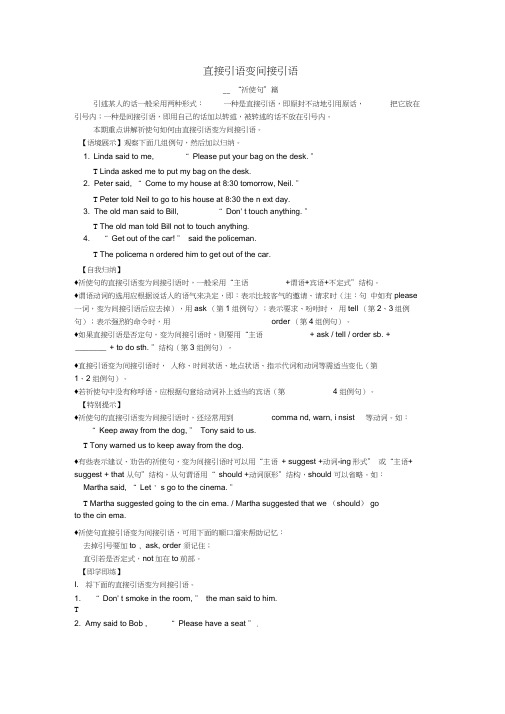
直接引语变间接引语__ “祈使句”篇引述某人的话一般采用两种形式:一种是直接引语,即原封不动地引用原话,把它放在引号内;一种是间接引语,即用自己的话加以转述,被转述的话不放在引号内。
本期重点讲解祈使句如何由直接引语变为间接引语。
【语境展示】观察下面几组例句,然后加以归纳。
1. Linda said to me, “ Please put your bag on the desk. ”T Linda asked me to put my bag on the desk.2. Peter said, “ Come to my house at 8:30 tomorrow, Neil. ”T Peter told Neil to go to his house at 8:30 the n ext day.3. The old man said to Bill, “ Don' t touch anything. ”T The old man told Bill not to touch anything.4. “ Get out of the car! ” said the policeman.T The policema n ordered him to get out of the car.【自我归纳】♦祈使句的直接引语变为间接引语时,一般采用“主语+谓语+宾语+不定式”结构。
♦谓语动词的选用应根据说话人的语气来决定,即:表示比较客气的邀请、请求时(注:句中如有please 一词,变为间接引语后应去掉),用ask (第1组例句);表示要求、吩咐时,用tell (第2、3组例句);表示强烈的命令时,用order (第4组例句)。
♦如果直接引语是否定句,变为间接引语时,则要用“主语+ ask / tell / order sb. +_______ + to do sth. ”结构(第3组例句)。
Unit14 语法间接引语
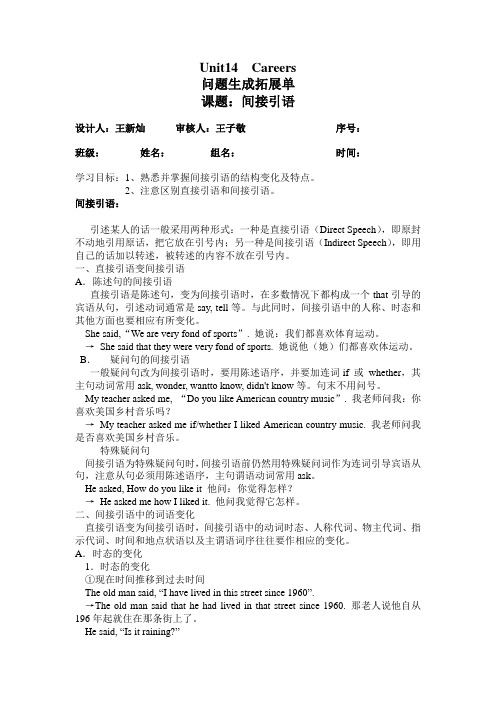
Unit14 Careers问题生成拓展单课题:间接引语设计人:王新灿审核人:王子敬序号:班级:姓名:组名:时间:学习目标:1、熟悉并掌握间接引语的结构变化及特点。
2、注意区别直接引语和间接引语。
间接引语:引述某人的话一般采用两种形式:一种是直接引语(Direct Speech),即原封不动地引用原话,把它放在引号内;另一种是间接引语(Indirect Speech),即用自己的话加以转述,被转述的内容不放在引号内。
一、直接引语变间接引语A.陈述句的间接引语直接引语是陈述句,变为间接引语时,在多数情况下都构成一个that引导的宾语从句,引述动词通常是say, tell等。
与此同时,间接引语中的人称、时态和其他方面也要相应有所变化。
She said,“We are very fond of sports”. 她说:我们都喜欢体育运动。
→She said that they were very fond of sports. 她说他(她)们都喜欢体运动。
B.疑问句的间接引语一般疑问句改为间接引语时,要用陈述语序,并要加连词if 或whether,其主句动词常用ask, wonder, wantto know, didn't know等。
句末不用问号。
My teacher asked me, “Do you like American country music”. 我老师问我:你喜欢美国乡村音乐吗?→My teacher asked me if/whether I liked American country music. 我老师问我是否喜欢美国乡村音乐。
特殊疑问句间接引语为特殊疑问句时,间接引语前仍然用特殊疑问词作为连词引导宾语从句,注意从句必须用陈述语序,主句谓语动词常用ask。
He asked, How do you like it 他问:你觉得怎样?→He asked me how I liked it. 他问我觉得它怎样。
- 1、下载文档前请自行甄别文档内容的完整性,平台不提供额外的编辑、内容补充、找答案等附加服务。
- 2、"仅部分预览"的文档,不可在线预览部分如存在完整性等问题,可反馈申请退款(可完整预览的文档不适用该条件!)。
- 3、如文档侵犯您的权益,请联系客服反馈,我们会尽快为您处理(人工客服工作时间:9:00-18:30)。
直接引语变间接引语——“祈使句”篇引述某人的话一般采用两种形式:一种是直接引语,即原封不动地引用原话,把它放在引号内;一种是间接引语,即用自己的话加以转述,被转述的话不放在引号内。
本期重点讲解祈使句如何由直接引语变为间接引语。
【语境展示】观察下面几组例句,然后加以归纳。
1. Linda said to me, “Please put your bag on the desk.”→Linda asked me to put my bag on the desk.2. Peter said, “Come to my house at 8:30 tomorrow, Neil.”→Peter told Neil to go to his house at 8:30 the next day.3. The old man said to Bill, “Don’t touch anything.”→The old man told Bill not to touch anything.4. “Get out of the car!” said the policeman.→The policeman ordered him to get out of the car.【自我归纳】◆祈使句的直接引语变为间接引语时,一般采用“主语+谓语+宾语+不定式”结构。
◆谓语动词的选用应根据说话人的语气来决定,即:表示比较客气的邀请、请求时(注:句中如有please一词,变为间接引语后应去掉),用ask(第1组例句);表示要求、吩咐时,用tell(第2、3组例句);表示强烈的命令时,用order(第4组例句)。
◆如果直接引语是否定句,变为间接引语时,则要用“主语+ ask / tell / order sb. + ________ + to do sth.”结构(第3组例句)。
◆直接引语变为间接引语时,人称、时间状语、地点状语、指示代词和动词等需适当变化(第1、2组例句)。
◆若祈使句中没有称呼语,应根据句意给动词补上适当的宾语(第4组例句)。
【特别提示】◆祈使句的直接引语变为间接引语时,还经常用到command, warn, insist等动词。
如:“Keep away from the dog,” Tony said to us.→Tony warned us to keep away from the dog.◆有些表示建议、劝告的祈使句,变为间接引语时可以用“主语+ suggest +动词-ing形式”或“主语+ suggest + that从句”结构,从句谓语用“should +动词原形”结构,should 可以省略。
如:Martha said, “Let’s go to the cinema.”→Martha suggested going to the cinema. / Martha suggested that we (should) go to the cinema.◆祈使句直接引语变为间接引语,可用下面的顺口溜来帮助记忆:去掉引号要加to,ask, order须记住;直引若是否定式,not加在to前部。
【即学即练】I. 将下面的直接引语变为间接引语。
1. “Don’t smoke in the room,” the man said to him.→_______________________________________________________2. Amy said to Bob, “Please have a seat”.→_______________________________________________________3. The policeman said, “Go away.”→_______________________________________________________4. “Let’s take the children to the zoo,” Alice said to me.→_______________________________________________________→_______________________________________________________II. 将下面直接引语变为间接引语。
1. The police shouted at the thief, “Stand still.”→_______________________________________________________2. Our English teacher said to us, “Speak English more often than just in class.”→_______________________________________________________3. “Please remember to answer this letter as soon as possible,” Helen said to Jack.→_______________________________________________________4. “Don’t go out alone after dark,” said the girl’s mother.→_______________________________________________________III. 将下面直接引语变为间接引语。
1. “Don’t play with fire, little boys,” the policeman said.→_______________________________________________________2. Kate said, “Let’s discuss the problem tomorrow.”→_______________________________________________________→_______________________________________________________3. “Do be quiet, please!” Helen said to the noisy boys.→_______________________________________________________→_______________________________________________________4. My sister said, “You’d better tidy your room by yourself.”→_______________________________________________________5. Li Ming said to me, “Will you keep the secret for me?”→_______________________________________________________IV. 从A、B、C和D四个选项中,选出可以填入空白处的最佳选项。
1. The teacher demanded that every student _____ there at once.A. wentB. need goC. goesD. go2. The man suggested that every student _____ there at once.A. should sendB. would be sentC. be sentD. to be sent3. Martin _____ his dog to lie down under the big tree.A. madeB. hadC. promisedD. ordered参考答案I.1. The boss ordered the clerk to change his dirty uniform.2. The little girl asked her father to tell her a story.3. Martin suggested staying there till the storm had passed. / Martin suggested that we (should) stay there till the storm had passed.4. Cassie told David not to play a trick on her again.II.1. The police ordered the thief to stand still.2. Our English teacher suggested that we (should) speak English more often than just in class.Our English teacher suggested speaking English more often than just in class.3. Helen asked Jack to remember to answer that letter as soon as possible.4. The gi rl’s mother warned her not to go out alone after dark.III.1. The policeman told the little boys not to play with fire.2. Kate suggested discussing the problem the next day.Kate suggested that we (should) discuss the problem the next day.3. Helen demanded the noisy boys be quiet.Helen ordered the noisy boys to be quiet.4. My sister advised me to tidy my room by myself.5. Li Ming asked me to keep the secret for him.IV.1-3 DCD。
